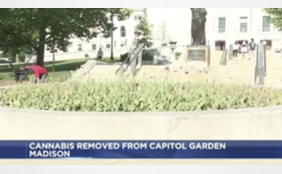
Aaron Pelley
● MARCH 17, 2023
As the current state of the American economy is one that many of our most esteemed economists would consider to be a “recession”, industries across the United States are being affected. One such industry being drastically impacted by the sunken state of the economy is the American cannabis industry. Even though it’s not fully legal in all 50 states and it’ll likely be several more years before federal cannabis reform passes according to the most optimistic predictions, the soon-to-be 21 states and counting have all been impacted by the recession in their own financial and employment-related ways.
In general, a recession on scale with what the US is currently experiencing is entirely new territory to the American cannabis industry. The last large recession, which became colloquially known as The Great Recession, happened in 2008 which was a full four years before Washington and Colorado voted to legalize. As the recreational cannabis industry had yet to exist in 2008, this recession is the first of its kind for the American cannabis industry to bear witness to.
For states on the West Coast and Pacific Northwest, the states that turned cannabis into the power crop that it is today, there are a variety of recession-caused economic issues that are impacting cannabis businesses across those regions.
In the very first state that legalized cannabis, Washington has seen a tremendous drop in their total retail sales. This past December, Channel 5 in Seattle reported that in just Pierce County alone, total cannabis sales had seen a 12 percent drop in 2022 compared to sales the previous year, when much of the country was still dealing with the immediate aftermath of a global pandemic. Across the entire Evergreen State, cannabis sales have dropped an approximate total of eight percent, equaling about $120 million in retail sales. Due to the scale and complexity of the American economy, there’s many economic factors that result in a recession and the ensuing drop in the employment rate.
However when speaking of the current state of the Washington cannabis industry and the sharp decrease in retail sales, one must consider the extremely high tax rate for cannabis sales in Washington. While Nevada for instance has a tax rate of 25 percent on retail cannabis, Washington’s tax rate is at an astonishing 37 percent. This tax rate alone would likely keep financially strapped cannabis consumers from being able to afford purchases at licensed dispensaries and may have to procure their cannabis from sources that aren’t taxed.
With Washington’s southern neighbor, Oregon is facing a very similar situation in terms of their economic situation in regards to the cannabis industry. Not only are sales similarly down in the state when compared to Washington, the price per gram of cannabis is also exponentially lower than that of the neighboring states, at only $4 according to the Oregon Liquor and Cannabis Commission. This oversupply status of cannabis products and lack of demand in Oregon cannabis has resulted in almost impossibly low prices yet not enough customers to buy all the products. In a legislative report from the OLCC in 2022, the regulators summarized the current state of affairs for Oregon cannabis as being caused by “declining wholesale and retail prices for usable marijuana are due to large stocks of usable marijuana inventory leftover from previous years, which is likely to continue to put downward pressure on prices.”
Even in the arguable mecca of cannabis, California hasn’t been safe from the economic downturn that is gravely impacting the American cannabis industry across the Legal States. For the first year since adult-use cannabis sales started in 2018, cannabis sales in The Golden State have dropped by nearly eight percent. As the size of the Californian cannabis economy is massive with $5.7 billion being sold in 2021, this eight percent drop resulted in a sales drop of an astronomical $473 million. Because sales are down such a considerable percentage and there’s significant competition from illegal markets and delivery services, this will result in an approximate drop of 23 percent in California tax revenue from cannabis.
Even strangely enough, cannabis-ancillary companies located on the West Coast that work primarily with cannabis cultivators and retailers yet don’t directly handle any product themselves are even being impacted by the current recession. The cannabis-based technology firm Dutchie implemented two different rounds of widespread layoffs in 2022. One round resulted in eight percent of the Dutchie workforce losing their jobs while a second wave of layoffs occurred in November.
WM Technology, the company that runs the wildly popular cannabis news and shopping site WeedMaps, has experienced significant layoffs of their own at even higher rates than their competitors. The Irvine, California-based company laid off a whole quarter of their workforce in November which amounted to about 175 employees in total. Although serving as WeedMaps’ unofficial direct competitor, Seattle-based Leafly laid off about 21 percent of its workforce in October, an almost similar percentage to WM Technology. Even companies as distantly ancillary-related to the cannabis industry as the Denver-based compliance software company Akerna experienced their own wave of layoffs, as they cut nearly 60 jobs last year.
In severe cases, some of American cannabis’ most established multi-state operators are going beyond only laying off dozens of employees in waves and instead shutting down entire cultivation facilities. Such as Curaleaf Holdings, who not only laid off a total of 270 jobs but also closed their Sacramento cultivation facility.
There may be possible remedies to these economic downfalls in the future, such as Nevada and Colorado opening cannabis consumption lounges and several of the Legal States implementing social equity programs which will hopefully result in revenue and employment opportunities. However, for an industry still very much in its infancy and one that won’t be federally legal for quite a few more years, the economic roadblocks and stagnations will continue to occur until large-scale reforms are enacted to address and remedy these issues.
PHONE

















